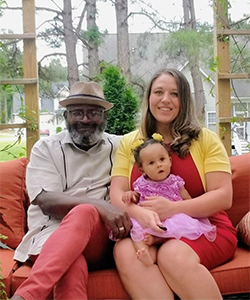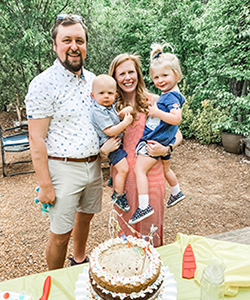For NC State staffer George Hibbler, the four weeks of paid time off he received to spend with his infant daughter were momentous.
During that four-week period, which started in January, George was on full-time daddy duty while his wife, Martha, whose maternity leave had ended, worked from home. As a result, George and his daughter, Xolani, were nearly inseparable. George consoled Xolani when she cried, put her to sleep, changed her diapers and helped feed her.

“That time was monumental because I got a chance to really bond with my daughter in a way that I probably wouldn’t have had the opportunity to do otherwise,” said George, an IT project manager in University Human Resources. “It was great for me to be here for her, for her to see me all day, every day for that period of time. NC State allowed me to really focus on her, not divide my time between trying to work and bonding with my daughter. It was all 100% our time — hers and mine.”
George received paid time off to bond with his daughter as a result of NC State’s paid parental leave program. The university’s Council on the Status of Women initiated the effort that resulted in the University of North Carolina System Board of Governors approving the program in September 2019. NC State implemented the program in 2020.
The program provides eight weeks of paid leave for eligible employees who give birth to a child. Eligible employees who become nonbirth parents, including adoptive and foster parents, receive four weeks of paid leave. Since the program’s inception at NC State, UHR has approved 442 paid parental leave requests.
“Paid parental leave is a positive way to support our employees in balancing their work and family lives and an important tool in the recruitment and retention of excellent employees,” said Donna Petherbridge, interim vice provost for DELTA and former chairperson of the Council on the Status of Women. “While I personally think the paid leave time should be increased for both birth and nonbirth parents, the paid leave we now have for our employees is a positive message in support of families and a critical tool for keeping women in the workforce over time.”
George said he cherishes the special time the paid parental leave program gave him with Xolani, who will turn 8 months old this month. He said the time he looked forward to the most while he was on leave was when he would go to his daughter’s bedroom after she woke up in the mornings, and she would flash him a big smile.
George still goes to Xolani’s room, and when she smiles at him, he melts.
“When I walk into her room, her smile just blows me away,” he said. “I know she’s glad to see me, and the feeling is mutual. I definitely live for those moments.”
George said paid leave programs like the one at NC State allow fathers to participate to a much greater extent in their newborn children’s lives.
“In today’s time, men want to feel like we’re more than just a guy who brings home the bacon,” George said. “We want to be fathers, and now we get a chance to step up in ways that we could never do before.”
Martha said she enjoyed observing George and Xolani as George developed a bond with her during those four weeks he was off. Before that, she said, Xolani almost exclusively wanted to be with her.
When George took over parental duties on an almost full-time basis while Martha worked, things were a bit rocky at first because Xolani needed some time to adjust to the change, Martha said. But the time father and daughter spent together after that was beautiful to see, she said.
“Because she’d only been with me for the first three months, and now she had to spend time with Dad, I really think that strengthened her comfort level with him,” Martha said.
Paid parental leave is a positive way to support our employees in balancing their work and family lives and an important tool in the recruitment and retention of excellent employees.
For Bona Bame, a human resources specialist in the College of Veterinary Medicine at NC State, it was comforting to know she would be able to take eight weeks of paid parental leave after the birth of her son, Knox, in March 2020. Bame used her personal leave to take off an additional two weeks.

“Leading up to the birth, if I was feeling really sick one day and needed to use a day of my own leave, I felt comfortable being able to do that and not worrying if that would set me back when the baby was born,” Bame said. “It was nice not to have that burden before the baby arrived.”
She said she felt especially thankful to have that time off as she began to hear news about the spread of the coronavirus in the United States.
Knox was born just as North Carolina and the rest of the country began to take precautions to prevent the spread of the coronavirus. Many businesses closed, and others asked employees to work at home.
Bame said the hospital released her about 24 hours after Knox’s birth. Before her release, Bame said hospital staff tried to assure her being home might be best for her and Knox.
“It was really strange because for nine months I had been preparing to be home for 10 to 12 weeks, and then all of a sudden the whole world was home with me, including my husband, who was working from home,” Bame said. “I’m like, ‘Wait a minute, this is supposed to be my time to watch Netflix.’
“It’s kind of hard to explain. It was really weird because I was so prepared to be home for that time. The rest of the world suddenly, unexpectedly joined me, and everybody was freaking out.”
Bame had a different experience during the birth of her first child, Amelia, 3. When her daughter was born, Bame had been working at NC State for 5½ years and was an executive search specialist in UHR. After Amelia was born, Bame was off for 12 weeks, but she used accumulated personal leave to take that time off.
“That was really great for me, especially as a first-time parent,” Bame said. “I don’t think I would have been ready to go back to work before 12 weeks. I was fortunate to have personal leave and not be concerned about finances, but I’m so thankful now we have another option for everyone to choose to have time off.”
- Categories:



